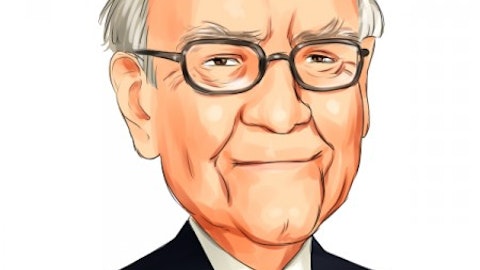Warren Buffett, Daniel Loeb, and T. Boone Pickens have all invested in Phillips 66 (NYSE:PSX).
The company trades at a price-to-earnings multiple of just 11.8 using adjusted earnings-per-share. The company has an above-average 2.7% dividend yield as well.
At first glance, Phillips 66 appears undervalued. This article takes a deeper look into the company’s operations to determine if the company really is a bargain… Or a value trap.
Phillips 66 (PSX) is one of the world’s largest downstream oil corporations. The company has a market cap of 44.4 billion.
Phillips 66 Business Overview
Phillips 66 operates in 4 segments. Each segment is shown below along with the percentage of adjusted income each has generated for Phillips 66 through the first 6 months of fiscal 2015:
– Refining: 53% of adjusted earnings
– Midstream: 6% of adjusted earnings
– Chemicals: 24% of adjusted earnings
– Marketing & Specialties: 18% of adjusted earnings
The Refining segment owns or has a stake in 15 refineries. These 15 refineries have a net crude oil capacity of 2.2 million barrels per day. The image below shows the geographical breakdown of the segment:
The Midstream segment is Phillips 66’s smallest based on adjusted earnings – responsible for just 6% of adjusted earnings through the first half of 2015. The Midstream segment owns oil and gas storage and transport assets in the US. Assets include:
– 72% ownership of Phillips 66 Partners (PSXP)
– 50% ownership of DCP Midstream LLC
The Chemicals segment consists of a 50%-50% joint partnership with Chevron; Chevron-Phillips Chemical Company (referred to here-on-out as CPChem). CPChem has 35 global manufacturing sites and is the largest producer of high density polyurethane in the United States.
The Marketing & Specialties segment primarily sells retail gas under following names: Phillips 66, Conoco, 76 brands, Jet, and Coop. In addition, the segment sells lubricants and other specialty products globally.
Dividends & Share Repurchases
Phillips 66 (NYSE:PSX) was spun-off from ConocoPhillips in 2012. At first glance, the company appears as though it has a short dividend history, but this is not the case.
Phillips 66 has not reduced its dividend payment since 1987 if you count the company’s pre-spin-off dividend payments from its parent company ConocoPhillips.
With an above-average 2.7% dividend yield and a payout ratio of 32%, it is very likely that Phillips 66 continues to pay rising dividends over the next several years.
The company does more than reward shareholders with rising dividends. Phillips 66 has engaged in extensive share repurchases since it was spun-off. From 2012 through 2014, Phillips 66 reduced its share count from 623.5 million to 546.4 million – a 12% reduction.
The company’s CEO Greg Garland clarified the company’s capital allocation budget in the company’s most recent earnings call:
“The guidance we’ve been giving and we’ll be consistent today, it’s kind of 60/40. Of the cash from all sources, 60% is going to go into reinvestment, 40% is going to be returned to shareholders through dividends and share repurchases. As long as we are trading under intrinsic value we are going to be buying shares and we’re buying shares every day.”
Based on the statements above, Phillips 66 will likely keep its dividend payout ratio in the 30% to 40% range. Garland stated that as long as we are trading under intrinsic value they will continue to do share repurchases. This means that if they were trading above intrinsic value, the company would stop doing share repurchases. When a management buys its own stock below fair value,and stops when it rises above fair value, they are doing a tremendous job of capital allocation.
Philips 66’s management is very shareholder friendly. It is extremely likely that the company continues rewarding shareholders with both rising dividend payments and reduced shares outstanding.
Hedge Fund Ownership
Several large investors and hedge funds have taken notice of Phillips 66’s low valuation and shareholder friendly management.
Legendary oil investor T. Boone Pickens has invested 4.6% of his portfolio into Phillips 66. Warren Buffett also owns shares of Phillips 66 (click here to see Warren Buffett’s 20 highest yielding dividend stocks).
In addition, Phillips 66 is one of Daniel Loeb’s 10 largest holdings. Loeb runs successful hedge fund Third Point, LLC.
Several of the world’s most iconic investors have taken a stake in Phillips 66. Examining the moves of highly successful investors doesn’t replace doing your own research – but it can help to validate an investment thesis.
Growth Prospects
The bulk of Phillips 66’s capital expenditures in 2015 are going to fund midstream growth. The image below breaks down expected fiscal 2015 capital expenditures:
The Sweeney Fractionator project was started in 2013 and is expected to be complete in the 3rd quarter of 2015. The fractionator is located in Old Ocean, Texas near Phillips 66’s refineries. It will be able to process 100,000 barrels per day. The products of the fractionator will be marketed to nearby petrochemical businesses, as well as for international exports.
Phillips 66 is also building an LPG export terminal in Freeport, Texas. The LPG export terminal will leverage the company’s transportation and storage infrastructure in the area. In total, the export terminal is expected to handle 4.4 million barrels a month of export capacity. The export facility is expected to be operational in mid-2016.
These two large projects combined with organic growth and share repurchases should continue to provide positive earnings growth for Phillips 66. All told, the company is expected to compound earnings-per-share at around 5% a year. I believe the company has a chance to exceed this growth rate due to the company’s management’s excellent capital allocation skills.
Final Thoughts
Phillips 66 (NYSE:PSX) has a solid dividend yield of 2.7% and expected earnings-per-share growth of 5%+. The company has a very shareholder friendly management as well.
Best of all, the company has a low price-to-earnings ratio of just 11.8. Phillips 66 combination of decent growth, above-average dividends, and low valuation gives it a high rank using The 8 Rules of Dividend Investing.
Phillips 66 is not a value trap. The company is an undervalued downstream oil and gas giant with a shareholder friendly management that will very likely reward shareholders with continued dividend growth and share repurchases.
Disclosure: None






